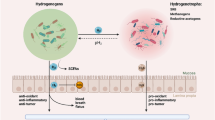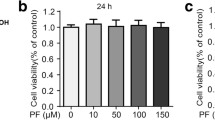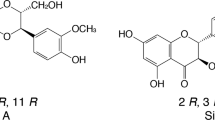Abstract
Objectives
5-Fluorouracil (5-FU), a chemotherapeutic drug, has severe deteriorating effects on the intestine, leading to mucositis. Glycyrrhizic acid is a compound derived from a common herbal plant Glycyrrhiza glabra, with mucoprotective, antioxidant and anti-inflammatory actions, however, associated with poor pharmacokinetics. Owing to the remarkable therapeutic action of glycyrrhizic acid-loaded polymeric nanocarriers in inflammatory bowel disease, we explored their activity against 5-FU-induced intestinal mucositis in mice. Polymeric nanocarriers have proven to be efficient drug delivery vehicles for the long-term treatment of inflammatory diseases, but have not yet been explored for 5-FU-induced mucositis. Therefore, this study aimed to produce glycyrrhizic acid-loaded polylactic-co-glycolic acid (GA-PLGA) nanoparticles to evaluate their protective and therapeutic effects in a 5-FU-induced mucositis model.
Methods
GA-PLGA nanoparticles were prepared using a modified double emulsion method, physicochemically characterized, and tested for in vitro drug release. Thereafter, mucositis was induced by 5-FU (50 mg/kg; IP) administration to the mice for the first 3 days (day 0, 1, 2), and mice were treated orally with GA-PLGA nanoparticles for 7 days (day 0–6).
Results
GA-PLGA nanoparticles significantly reduced mucositis severity measured by body weight, diarrhea score, distress, and anorexia. Further, 5-FU induced intestinal histopathological damage, altered villi-crypt length, reduced goblet cell count, elevated pro-inflammatory mediators, and suppressed antioxidant enzymes, all of which were reversed by GA-PLGA nanoparticles.
Conclusion
Morphological, behavioral, histological, and biochemical results suggested that GA-PLGA nanoparticles were efficient, biocompatible, targeted, and sustained release drug delivery nano-vehicle for enhanced mucoprotective, anti-inflammatory, and antioxidant effects in 5-FU-induced intestinal mucositis.
Graphic abstract









Similar content being viewed by others
Data availability
Manuscirpt has no associate data. Raw data will be available on a suitable request.
References
Ali H, Weigmann B, Collnot E-M, Khan SA, Windbergs M, Lehr C-M (2016) Budesonide loaded PLGA nanoparticles for targeting the inflamed intestinal mucosa—pharmaceutical characterization and fluorescence imaging. Pharm Res 33:1085–1092
Ali J, Khan AU, Shah FA, Ali H, Islam SU, Kim YS, Khan S (2019) Mucoprotective effects of Saikosaponin-A in 5-fluorouracil-induced intestinal mucositis in mice model. Life Sci 239:116888
Arruda LF, Arruda SF, Campos NA, de Valencia FF, de Siqueira EMA (2013) Dietary iron concentration may influence aging process by altering oxidative stress in tissues of adult rats. PLoS ONE 8:e61058
Atiq A et al (2019) Diadzein ameliorates 5-fluorouracil-induced intestinal mucositis by suppressing oxidative stress and inflammatory mediators in rodents. Eur J Pharmacol 843:292–306. https://doi.org/10.1016/j.ejphar.2018.12.014
Basile D et al (2019) Mucosal injury during anti-cancer treatment: from pathobiology to bedside. Cancers 11:857
Blijlevens N, Donnelly J, De Pauw B (2000) Mucosal barrier injury: biology, pathology, clinical counterparts and consequences of intensive treatment for haematological malignancy: an overview. Bone Marrow Transplant 25:1269–1278
Bode AM, Dong Z (2015) Chemopreventive effects of licorice and its components. Curr Pharmacol Rep 1:60–71
Boisseau P, Loubaton B (2011) Nanomedicine, nanotechnology in medicine. C R Phys 12:620–636
Chang C-T et al (2012) 5-Fluorouracil induced intestinal mucositis via nuclear factor-κB activation by transcriptomic analysis and in vivo bioluminescence imaging. PLoS ONE 7:e31808–e31808. https://doi.org/10.1371/journal.pone.0031808
Chen H et al (2020) Berberine regulates fecal metabolites to ameliorate 5-fluorouracil induced intestinal mucositis through modulating gut microbiota. Biomed Pharmacother 124:109829. https://doi.org/10.1016/j.biopha.2020.109829
Cherng J-M, Lin H-J, Hung M-S, Lin Y-R, Chan M-H, Lin J-C (2006) Inhibition of nuclear factor κB is associated with neuroprotective effects of glycyrrhizic acid on glutamate-induced excitotoxicity in primary neurons. Eur J Pharmacol 547:10–21
Collnot E-M, Ali H, Lehr C-M (2012) Nano-and microparticulate drug carriers for targeting of the inflamed intestinal mucosa. J Control Release 161:235–246
Danhier F, Ansorena E, Silva JM, Coco R, Le Breton A, Préat V (2012) PLGA-based nanoparticles: an overview of biomedical applications. J Control Release 161:505–522
dos Filho EXS et al (2016) Curcuminoids from Curcuma longa L. reduced intestinal mucositis induced by 5-fluorouracil in mice: Bioadhesive, proliferative, anti-inflammatory and antioxidant effects. Toxicol Rep 3:55–62
Duncan M, Grant G (2003) Oral and intestinal mucositis—causes and possible treatments. Aliment Pharmacol Ther 18:853–874
Erben U et al (2014) A guide to histomorphological evaluation of intestinal inflammation in mouse models. Int J Clin Exp Pathol 7:4557
Gelen V, Şengül E, Yıldırım S, Atila G (2018) The protective effects of naringin against 5-fluorouracil-induced hepatotoxicity and nephrotoxicity in rats. Iran J Basic Med Sci 21:404–410. https://doi.org/10.22038/IJBMS.2018.27510.6714
Habig WH, Pabst MJ, Jakoby WB (1974) Glutathione S-transferases the first enzymatic step in mercapturic acid formation. J Biol Chem 249:7130–7139
Hadwan MH, Abed HN (2016) Data supporting the spectrophotometric method for the estimation of catalase activity. Data Brief 6:194–199
Keefe D, Cummins A, Dale B, Kotasek D, Robb T, Sage R (1997) Effect of high-dose chemotherapy on intestinal permeability in humans. Clin Sci (london, England: 1979) 92:385–389
Khan R et al (2013) Glycyrrhizic acid suppresses the development of precancerous lesions via regulating the hyperproliferation, inflammation, angiogenesis and apoptosis in the colon of Wistar rats. PLoS ONE 8:e56020
Khan R, Rehman MU, Khan AQ, Tahir M, Sultana S (2018) Glycyrrhizic acid suppresses 1, 2-dimethylhydrazine-induced colon tumorigenesis in Wistar rats: alleviation of inflammatory, proliferation, angiogenic, and apoptotic markers. Environ Toxicol 33:1272–1283
Lalla RV et al (2014) MASCC/ISOO clinical practice guidelines for the management of mucositis secondary to cancer therapy. Cancer 120:1453–1461. https://doi.org/10.1002/cncr.28592
Leocádio PC et al (2015) L-arginine pretreatment reduces intestinal mucositis as induced by 5-FU in mice. Nutr Cancer 67:486–493
Li H-L et al (2017) Alteration of gut microbiota and inflammatory cytokine/chemokine profiles in 5-fluorouracil induced intestinal mucositis. Front Cell Infect Microbiol 7:455
Logan RM, Stringer AM, Bowen JM, Gibson RJ, Sonis ST, Keefe DM (2009) Is the pathobiology of chemotherapy-induced alimentary tract mucositis influenced by the type of mucotoxic drug administered? Cancer Chemother Pharmacol 63:239–251
Ming LJ, Yin ACY (2013) Therapeutic effects of glycyrrhizic acid. Nat Prod Commun. https://doi.org/10.1177/1934578X1300800335
Moron MS, Depierre JW, Mannervik B (1979) Levels of glutathione, glutathione reductase and glutathione S-transferase activities in rat lung and liver. Biochimica Et Biophysica Acta (BBA) Gen Subj 582:67–78
Naidu MUR, Ramana GV, Rani PU, Mohan IK, Suman A, Roy P (2004) Chemotherapy-induced and/or radiation therapy-induced oral mucositis—complicating the treatment of cancer. Neoplasia (new York, NY) 6:423
Ploeger BA, Meulenbelt J, DeJongh J (2000) Physiologically based pharmacokinetic modeling of glycyrrhizic acid, a compound subject to presystemic metabolism and enterohepatic cycling. Toxicol Appl Pharmacol 162:177–188
Soares PM et al (2008) Gastrointestinal dysmotility in 5-fluorouracil-induced intestinal mucositis outlasts inflammatory process resolution. Cancer Chemother Pharmacol 63:91–98
Song M-K, Park M-Y, Sung M-K (2013) 5-Fluorouracil-induced changes of intestinal integrity biomarkers in BALB/c mice. J Cancer Prev 18:322
Stringer AM, Gibson RJ, Logan RM, Bowen JM, Yeoh AS, Hamilton J, Keefe DM (2009) Gastrointestinal microflora and mucins may play a critical role in the development of 5-fluorouracil-induced gastrointestinal mucositis. Exp Biol Med 234:430–441
Su X, Wu L, Hu M, Dong W, Xu M, Zhang P (2017) Glycyrrhizic acid: a promising carrier material for anticancer therapy. Biomed Pharmacother 95:670–678. https://doi.org/10.1016/j.biopha.2017.08.123
Tadesse S, Corner G, Dhima E, Houston M, Guha C, Augenlicht L, Velcich A (2017) MUC2 mucin deficiency alters inflammatory and metabolic pathways in the mouse intestinal mucosa. Oncotarget 8:71456
Takeuchi I, Kamiki Y, Makino K (2018) Therapeutic efficacy of rebamipide-loaded PLGA nanoparticles coated with chitosan in a mouse model for oral mucositis induced by cancer chemotherapy. Colloids Surf B 167:468–473
van Vliet MJ, Harmsen HJ, de Bont ES, Tissing WJ (2010) The role of intestinal microbiota in the development and severity of chemotherapy-induced mucositis. PLoS Pathog 6:e1000879
Wang YM, Du GQ (2016) Glycyrrhizic acid prevents enteritis through reduction of NF-κB p65 and p38MAPK expression in rat. Mol Med Rep 13:3639–3646
Wang C-Y, Kao T-C, Lo W-H, Yen G-C (2011) Glycyrrhizic acid and 18β-glycyrrhetinic acid modulate lipopolysaccharide-induced inflammatory response by suppression of NF-κB through PI3K p110δ and p110γ inhibitions. J Agric Food Chem 59:7726–7733. https://doi.org/10.1021/jf2013265
Wang X-r, Hao H-g, Chu L (2017) Glycyrrhizin inhibits LPS-induced inflammatory mediator production in endometrial epithelial cells. Microbial Pathog 109:110–113. https://doi.org/10.1016/j.micpath.2017.05.032
Whittaker AL, Lymn KA, Wallace GL, Howarth GS (2016) Differential effectiveness of clinically-relevant analgesics in a rat model of chemotherapy-induced mucositis. PLoS ONE 11:e0158851. https://doi.org/10.1371/journal.pone.0158851
Wright TH et al (2009) The herbal extract Iberogast® improves jejunal integrity in rats with 5-fluorouracil (5-FU)-induced mucositis. Cancer Biol Ther 8:923–929
Yan X-x et al (2020) A new recombinant MS-superoxide dismutase alleviates 5-fluorouracil-induced intestinal mucositis in mice. Acta Pharmacol Sin 41:348–357
Yang T et al (2017) Enhanced efficacy with reduced toxicity of chemotherapy drug 5-fluorouracil by synergistic treatment with Abnormal Savda Munziq from Uyghur medicine. BMC Complement Altern Med 17:201. https://doi.org/10.1186/s12906-017-1685-4
Yeung C-Y et al (2015) Amelioration of chemotherapy-induced intestinal mucositis by orally administered probiotics in a mouse model. PLoS ONE 10:e0138746
Yuan H, Ma Q, Ye L, Piao G (2016) The traditional medicine and modern medicine from natural products. Molecules 21:559
Zeeshan M, Ali H, Khan S, Khan SA, Weigmann B (2019a) Advances in orally-delivered pH-sensitive nanocarrier systems; an optimistic approach for the treatment of inflammatory bowel disease. Int J Pharm 558:201–214
Zeeshan M, Ali H, Khan S, Mukhtar M, Khan MI, Arshad M (2019b) Glycyrrhizic acid-loaded pH-sensitive poly-(lactic-co-glycolic acid) nanoparticles for the amelioration of inflammatory bowel disease. Nanomedicine 14:1945–1969
Zhang T et al (2017a) Volatile oil from Amomi Fructus attenuates 5-fluorouracil-induced intestinal mucositis. Front Pharmacol 8:786
Zhang S, Liu Y, Xiang D, Yang J, Liu D, Ren X, Zhang C (2018) Assessment of dose-response relationship of 5-fluorouracil to murine intestinal injury. Biomed Pharmacother 106:910–916
Zhang L, Jin Y, Peng J, Chen W, Lisha L, Lin J (2019) Qingjie Fuzheng Granule attenuates 5-fluorouracil-induced intestinal mucosal damage. Biomed Pharmacother 118:109223. https://doi.org/10.1016/j.biopha.2019.109223
Acknowledgements
We have acknowledged Prof. Benno Weigmann, University of Erlangen-Nürnberg, Germany, for his expert advice in the experiments.
Funding
The manuscript has been funded under HEC NRPU project No. 9272/Federal/NRPU/R&D/HEC/2017.
Author information
Authors and Affiliations
Corresponding author
Ethics declarations
Conflict of interest
Authors declared no conflict of interests.
Ethics approval
All animal studies were approved and performed according to the bioethical committee protocols of Quaid-i-Azam University, Islamabad for the care and use of laboratory animals (Approval no. BES-fbs-QAU2018-75).
Additional information
Publisher's Note
Springer Nature remains neutral with regard to jurisdictional claims in published maps and institutional affiliations.
Rights and permissions
About this article
Cite this article
Zeeshan, M., Atiq, A., Ain, Q.U. et al. Evaluating the mucoprotective effects of glycyrrhizic acid-loaded polymeric nanoparticles in a murine model of 5-fluorouracil-induced intestinal mucositis via suppression of inflammatory mediators and oxidative stress. Inflammopharmacol 29, 1539–1553 (2021). https://doi.org/10.1007/s10787-021-00866-z
Received:
Accepted:
Published:
Issue Date:
DOI: https://doi.org/10.1007/s10787-021-00866-z




